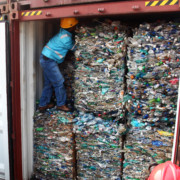What’s the deal with the Plastic Soup again?
March 15 2024 That’s what readers of news site nu.nl on their comment platform Nujij were wondering. In a recent […]
12 February 2021
By 2025, Dutch supermarkets promise to use 20% less plastic packaging material than in 2017. According to this promise, by 2021, we should have achieved a reduction of around 10%. However, if you look around in any supermarket, you will not get the impression that there is already a significant reduction in plastic packaging. How can this be?
For the third time, the Environmental Investigation Agency (EIA) analyzed the UK’s situation together with Greenpeace to see what British supermarkets are doing about plastic pollution. Very little, according to the report Checking Out on Plastics III.
We can learn a lot from this, also for the Netherlands.
In the United Kingdom, the ten largest supermarket chains were responsible for almost 900,000 tonnes of plastic packaging in 2019. Compared to 2018, this is a reduction of only 1.6%, but compared to 2017, it appears to be an increase of 1.2%. So on balance, the amount of plastic packaging in this country has barely changed in recent years, even though supermarkets are also aiming for reduction targets.
One remarkable finding in the British report is the difference between private labels and A-brands. Initiatives to reduce plastic packaging relate almost exclusively to supermarket chains’ brands. No firm agreements are made with the A-brands, such as Coca-Cola, Nestlé, or Unilever.
Many of the initiatives, including lighter packaging, may reduce the amount of plastic, but they are not a solution to plastic pollution.
The agreement seems set in stone: in 2025, there will be 20% less packaging material in Dutch supermarkets. The 20% reduction is stated in the Plastic Pact and co-signed by supermarket chains, but is voluntary.
The percentage is also in the Sustainable Packaging Sector Plan 2019-2022. This plan was drawn up in April 2019 by the Central Food Bureau (CBL). However, you have to read the small print and master the jargon to understand that in the Netherlands, too, the target only concerns their own brands.
The agreements within the chain are hardly about an absolute reduction of plastic packaging. It is more about making all packaging 100% recyclable and then using more recyclate in the packaging.
The agreement is a 20% reduction of plastic packaging in kilos compared to 2017. But who knows what numbers we are talking about in that year? The Sustainable Packaging Sector Plan 2019-2022 was assessed by a Board of Independent Experts. The Board was concerned about the baseline measurement: ‘The Board identifies that for the goal of weight reduction, a baseline measurement is essential. This is currently insufficiently reflected in the plan (…)’.
The Plastic Pact also assumes a baseline measurement for the year 2017. RIVM was commissioned to collect the data. The conclusion in the report Plastic Pact Netherlands: the Monitor Zero Measurement (2017-1018) from 2019 was that there are, however, too few data available to measure the progress of the Plastic Pact. Only 40% of the participating companies provided data.
In short, the baseline measurement failed, and that means it is impossible to assess whether the set reduction target is being met.
Meanwhile, the agreements on recycling and recyclate are also proving difficult to meet. Dutch multinationals that fill supermarkets with their products are already covering their bases and complain in a report recently presented to European Commissioner Frans Timmermans about a lack of good quality recycled plastic. Because ‘if you start recycling, the quality usually goes down,’ said Unilever top woman De Haan at the presentation. She argued for a system change in the chain in which the parties cooperate better.
The British report authors also call for system change, but then one that is genuinely aimed at reducing plastic pollution. Some of their recommendations, which the Dutch supermarkets should also embrace together, are:
March 15 2024 That’s what readers of news site nu.nl on their comment platform Nujij were wondering. In a recent […]
The first Impact Fair is Europe’s largest Impact Experience. An interactive ‘immersive’ experience of impactful examples.
The waste-export to countries outside of the EU has been restricted The Netherlands is against a carpet ban on shipping of plastic waste.
The waste-export to countries outside of the EU has been restricted The Netherlands is against a carpet ban on shipping of plastic waste.

 Ban the export of plastic waste!
Ban the export of plastic waste!